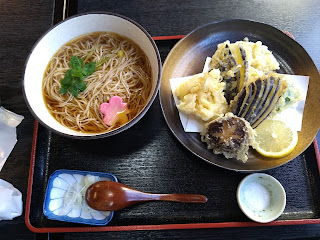Devil's Washboard
As I took this first recording, I was standing on one of the long, thin rocks that are called the Devil's Washboard in Aoshima. In addition to the wind and the roar of larger ocean waves, you can hear water trickling against the rocks.
palm trees blowing in the wind at the garden near Aoshima.
Udo Jingu
I talked about both Aoshima and Udo Jingu in a previous blog post.
Ikeyama Fountainhead 1
The Ikeyama Fountainhead is a spring in Kumamoto. It was so cool to see fresh water bubbling up from the earth. It was calm and quiet; this recording is taken downstream, where the river picks up a little bit.
Ikeyama Fountainhead 2
By the fountainhead itself. Aside from the voices near the end of the recording, the only sounds are the water, the trees, and a singing bird.
Shiraike in Beppu
Many of the hot springs in Beppu, Oita are nearly boiling-- far too hot for a bath. Eerily, you can hear the hot steam as it comes out of the earth.
Oniyama
According to a sign by this hot spring, "The force of the steam is so strong here that about one and a half train cars can be pulled by its pressure."
Tatsumaki Geyser
This is the sound of boiling water shooting out of the earth.
Fukuoka Wine Festival
My friend and I coincidentally stumbled into a jazzy wine festival when we were in Fukuoka! A couple of kids were following the saxophone player around, and he kept on turning around suddenly and making them laugh.
walking in the rain
The wine festival broke up after it started pouring, and my friend and I walked back to our AirBnb in the rain.
Fukuoka Castle Ruins 1
It's not too surprising that we kept coming across live music, since we were travelling during Golden Week! I cannot for the life of me figure out what this song is. Is it from a video game? It's very familiar!
Fukuoka Castle Ruins 2
Nijo Castle
The squeaking you hear is from the so-called "Nightengale floors." The hinges on the floors make a sound that poetic Edo period Japanese people compared to the sound of a nightengale.
Near Cocoa Market Mirabelle
Underneath a chocolate shop is a "secret" café, Angel Library. You have to know it's there (which isn't difficult, as it's on several online lists of things to do in Kyoto) and ask one of the workers at the chocolate shop for the location of the entrance and the passcode. Because it was such a busy travel time, we had a bit of a wait. The shop is next to a lovely stream.
Inside Angel Library
Kirishima Shrine
Kirishima is a volcano on the border of Miyazaki and Kagoshima prefectures. I visited Kirishima and Sakurajima (the most active volcano in Japan) with some friends in May. It was raining the whole time. I do love the sound of rain.
a small brook near the Usuki Stone Buddhas
As I recorded, I watched some very speedy fish flit around in the shallow water.
living room on a rainy morning
I had a lovely morning, eating breakfast and reading my book as it rained outside. Less pleasant: going out into the rain to get to work.
Thanks for reading (and listening!)


































































